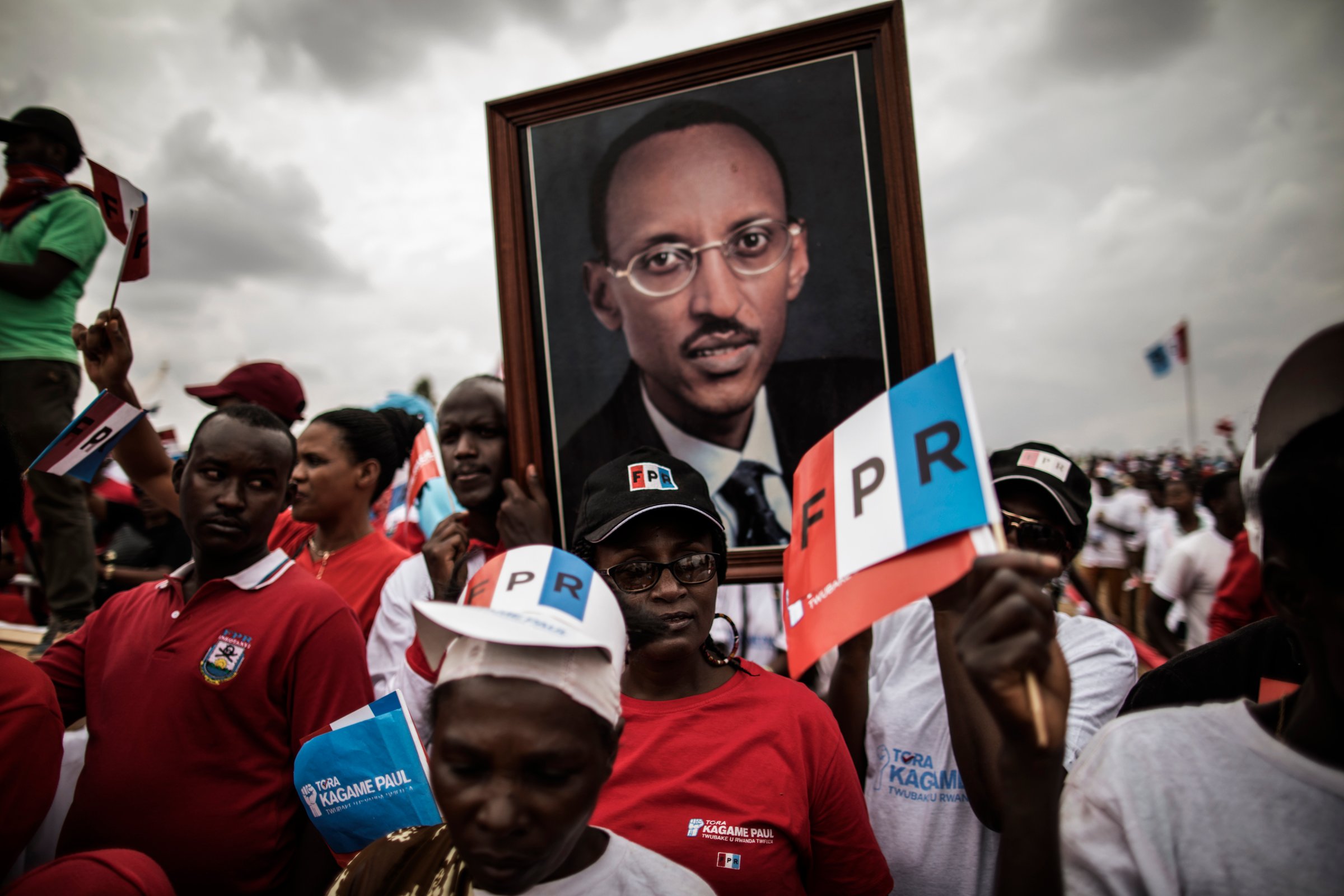
One of the most divisive leaders on the African continent looked set to win another seven years in power on Friday, after millions of registered voters cast their ballot in the Rwanda’s third election since the 1994 Rwandan genocide. After 17 years in power, Paul Kagame has been cast as both a hero and a villain by Rwandans and international observers.
Rwanda has undoubtedly made strides under Kagame’s rule. He has been credited for uniting the country after more than 800,000 ethnic Tutsis and their Hutu sympathizers were murdered by Hutu extremists in 100 days, and today Rwanda is the darling of Western donors. It averaged an 8% growth rate between 2001-2015 and the World Bank says it is the easiest country to do business with in Africa.
The 59-year-old former rebel commander’s socio-economic development programs have also improved Rwandans’ lives across the economic spectrum, “regardless of ethnic group,” says Phil Clarke, Rwanda expert and reader in Comparative and International Politics at the School of Oriental and African Politics [SOAS] in London. There is universal health cover, infant mortality has plummeted, infrastructure has been built and GDP per capita has risen from around $125 to more than $700. The country has a majority-female parliament, which then U.N. Secretary General Ban Ki-Moon hailed in 2013. “I hope many African nations will emulate what Rwanda is doing,” Ban said.
Yet all this progress has come at the cost of the country’s democracy. Kagame and his party, the Rwandan Patriotic Front (RPF), might now potentially remain in power until 2034. After being barred from standing for a third term this year, Kagame was allowed to run again after a “spontaneous” petition encouraging him, followed by a referendum that gave him the go-ahead to stand in this this year’s election and two more after that of five-year-terms each. “The big ramifications of today’s vote could mean another 17 years of Kagame rule,” Clarke says. “I don’t think that is healthy for any African state.”
Although Kagame is undoubtedly popular in Rwanda, he won polls in 2003 and 2010 with more than 90% of the ballots cast — numbers analysts attribute to a high degree of coercion in the lead up to general votes. According to the Associated Press, candidates have been barred from putting up campaign posters in public places, while the electoral commission threatened to vet candidates’ messages on social media. Days after his strongest opponent, Diane Shima Rwigara, announced her intention to run in this year’s election, nude photos began to circulate the Internet. The 35-year-old was later disqualified from the race in July.
Kagame’s administration has also been dogged by allegations of repression, torture and political murders. “Each year that Kagame stays in power more Rwandan politicians are killed, jailed or forced into exile,” Anjan Sundaram, author of Bad News: Last Journalists in a Dictatorship, wrote in Africa is a Country. A warning echoed by Amnesty International in a July report, that says two decades of attacks on opponents have lead to a “climate of fear” ahead of Friday’s vote. Yet many Rwandans are willing to tolerate political repression for economic development. “Two things are happening” Clarke says. “There is a fear factor, but there is also an element of enthusiasm.”
The president’s brand of autocracy has led some to liken him to Singapore’s late founding leader, Lee Kuan Yew— whose system of free market capitalism and benevolent dictatorship transformed the similarly small country into a regional powerhouse in under a generation. But the comparison only goes so far. “Unlike Singapore, Rwanda economy is not sky rocketing,” Clarke says in relation to the country’s reliance on foreign aid, which is estimated to be 30% of the national GDP, and the ruling party’s stakes in most of Rwanda’s biggest companies. This state of affairs has turned off some foreign investors and scuppered plans to turn the country into Africa’s Silicon Valley.
Kagame may be eager to serve another 17 years as President, but it’s not clear he’ll get the chance. Members of his own party have already suggested a change in leadership, and the country’s demographics are against him. Population growth in Rwanda is exponential. More than half the country is under 25. It will only be a matter of time when the population gains an appetite for a new personality and a refresh of the governmental apparatus, Clarke predicts. “In a situation like that, you need a leadership that requires a new dimension.”
More Must-Reads From TIME
- The 100 Most Influential People of 2024
- The Revolution of Yulia Navalnaya
- 6 Compliments That Land Every Time
- What's the Deal With the Bitcoin Halving?
- If You're Dating Right Now , You're Brave: Column
- The AI That Could Heal a Divided Internet
- Fallout Is a Brilliant Model for the Future of Video Game Adaptations
- Want Weekly Recs on What to Watch, Read, and More? Sign Up for Worth Your Time
Contact us at letters@time.com